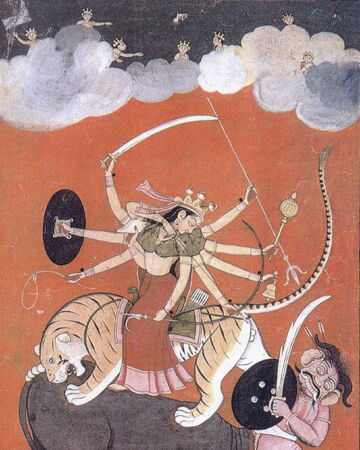Durga Definition:
Durga is a Hindu goddess widely revered in India and beyond. She is the embodiment of feminine power and is often depicted as a fierce warrior, riding a lion or tiger, with multiple arms and weapons. The name “Durga” comes from the Sanskrit word “durgā,” which means “fortress” or “invincible.”

Durga’s History
The Vedas, ancient Hindu texts composed between 1500 BCE and 500 BCE, refer to Durga as a divine power or shakti, associated with the force of creation, preservation, and destruction.Over time, she became more prominently featured in Hindu mythology, and her legend grew in complexity and significance.
One of the most famous stories about Durga comes from the Devi Mahatmya, a text composed in the 5th or 6th century CE. The gods created her to defeat the demon Mahishasura who threatened to destroy the universe. In a fierce battle, she defeated Mahishasura and his armies, restoring order to the cosmos.

Associated Festivals
The Hindu festival of Navaratri, which celebrates Durga’s victory over Mahishasura, lasts nine nights and ten days. During the celebration, people engage in feasting, fasting, and the worship of Durga and other deities. In addition, active participation in rituals and cultural activities is an important part of the festivities. During this time, devotees engage in various rituals to invoke Durga’s blessings, including singing hymns and chanting mantras in praise of her. Additionally, they may participate in cultural activities and offer prayers at temples and other sacred sites.

Throught the Years
Throughout history, people have celebrated Durga as a symbol of feminine power and independence. Moreover, she embodies the ability to overcome obstacles, defeat evil, and restore balance to the world. In addition, her iconography and mythology have exerted a significant influence on Indian art, literature, and culture. Consequently, she continues to inspire millions of people around the world.
You can help us by buying our Indian products in our shop on the following link.